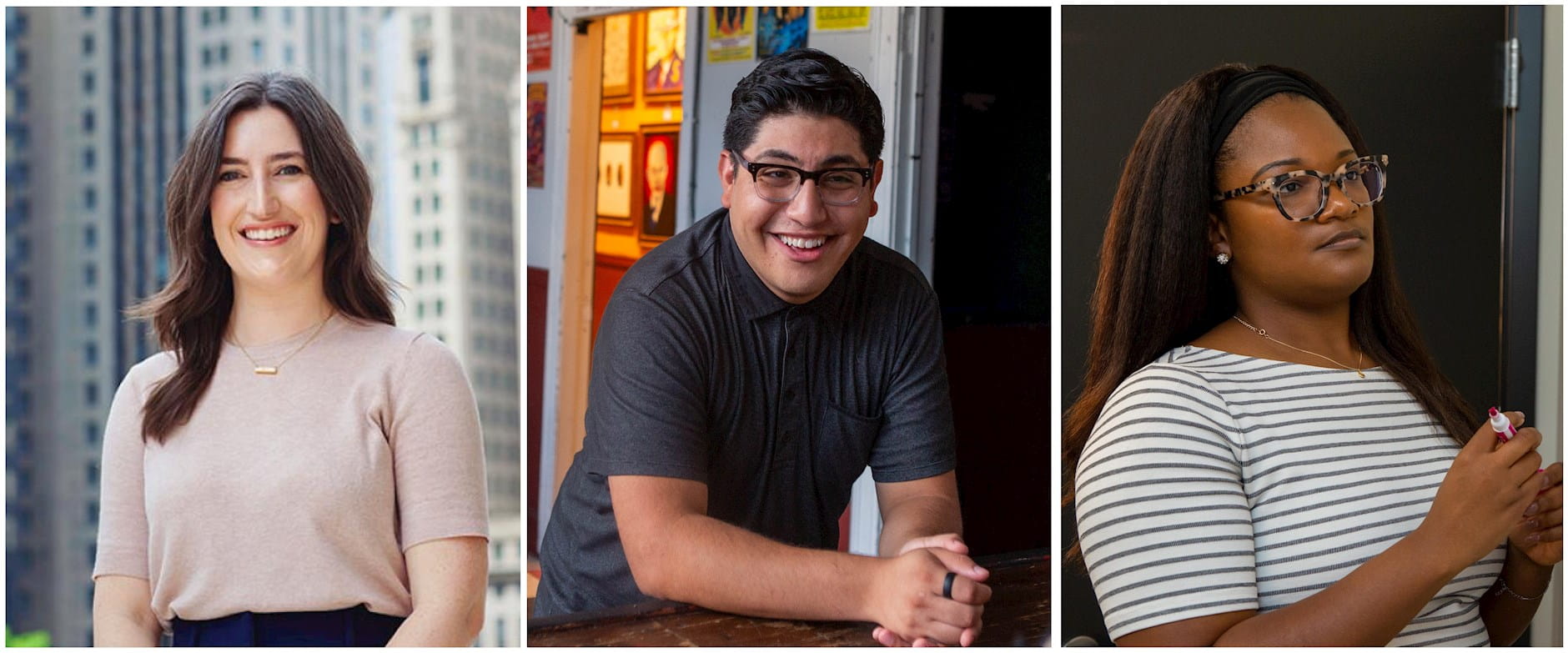Using data to quantify the likely impact of rain on ticket sales. Unpacking the scientific and the political components of policies on climate change. Rethinking hiring practices with a newfound awareness of hidden biases. Viewing the world as full of possibilities.
Neubauer Civic Scholars at the University of Chicago Booth School of Business, are discovering that earning an MBA is expanding their skills and perspectives in unexpected ways.
“Before I came to Booth, I saw my professional opportunities through a very small lens. That lens has widened exponentially,” said Louisa Shepherd, a Neubauer Civic Scholar who planned to focus on entrepreneurship when she first joined.
Shepherd chose financial accounting as her first class at Booth and immediately began implementing the concepts in her day job at a nonprofit. She is now excited about pivoting to a career in financial management and strategy at a social sector organization - something that she could not have imagined while earning an undergraduate degree in clarinet performance. “You don’t know what you don’t know,” she said.
The Chicago Booth Civic Scholars program, which offers full tuition scholarships and dedicated programming to MBA students who come from nonprofit or government organizations, attracts candidates who want to use business skills to amplify social impact in sectors such as the arts, education, public health, and the government.
Jorge Silva came to the Civic Scholars program with a background in theater, and first hand knowledge of the precarious nature of funding for arts organizations. Halfway through the MBA curriculum, he’s already put several classes to immediate use - statistics to understand why ticket sales fluctuate, accounting to get a better picture of the finances, behavioral economics to nudge better auditions. And then there’s the additional, unexpected, benefit - a much more robust network than he had anticipated.
As a part-time student with a full time job and a non-traditional MBA background, Silva had been unsure about whether he would fit in or have the time to network. It was a revelation when he found that classmates were as fascinated by his background as he was with theirs. He built deeper connections through the programming for Neubauer Civic Scholars, including retreats and book discussions. “I will be walking away with a much greater network than I expected,” he said.
Amanda Lee, a pediatric nurse practitioner who is a Neubauer Civic Scholar and a University of Chicago Obama Foundation Scholar, describes the Civic Scholars program as the start of a lifelong relationship with the school. In class, Lee said she was accumulating notes for future reference. “Booth teaches us to think with a critical eye, to understand the problem first and to solve it second. What we are learning here is relevant to any problem,” she said. Once she graduates, she is looking forward to maintaining both the network and the learning process. “Just because you are not a student any more, doesn’t mean that you lose access to the resources,” she said.
Lee had joined the program, expecting to take some classes outside Booth to broaden her perspective on the factors impacting healthcare in the US. But she was pleasantly surprised at the range of the classes offered at the Booth. A quarter away from graduating, Lee said she felt no need to go elsewhere.
“I was shocked by just how much I liked the flexibility of the curriculum and the way in which Booth brings in the broader university,” she said, citing classes such as Managing the Workplace which gave insights into economic mobility and Political Economy of Climate Change which delved into multiple factors that impact policies.
What’s the one piece of advice that they would give prospective applicants to the Civic Scholars program?
The answer is simple: Apply. Coming from backgrounds where MBAs were not the norm, the three Neubauer Civic Scholars are familiar with the trepidation that some applicants have while applying to Booth.
“Anybody who is working in a social impact space has already dealt with complex problems. You can do this,” said Silva. “It opens up so many more possibilities.”
“There’s no reason to place barriers on yourself,” said Lee. “Aim high.”
“I had a music degree, not a traditional business background,” said Shepherd, noting that Booth did not require prerequisites but built the foundations for the degree into the curriculum. “This place is for you.”
The Chicago Booth Civic Scholars Program offers a full-tuition scholarship to MBA students who work in a 501(c) designated nonprofit organization or for the government. The program, funded by a gift from the Neubauer Family Foundation, supports qualified professionals in Booth’s Full-Time MBA, Evening MBA, and Weekend MBA Programs.
For more information about the Chicago Booth Civic Scholars Program click here.


